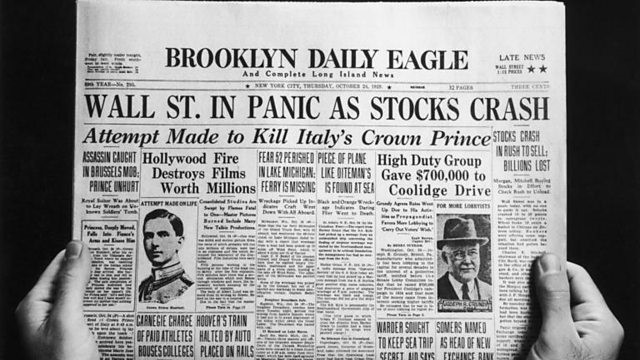The savviest investors know this: That a market correction — especially a big correction — can in time lead to the biggest gains.
The 1929 market crash has some similarities to the situation we now find ourselves in. It too followed roaring times after a global pandemic. A period of money-printing and low interest rates.
From 1929 to 1932, the American stock market lost around 80% of its value.

The 1929 stock market crash heralded The Great Depression. Source: BBC
But it did flex back.
‘An investor who invested a lump sum in the average stock at the market’s 1929 high would have been back to a break-even by late 1936, less than four and a half years after the mid-1932 market low.’
—New York Times analysis, 2009
So to the question: When the next correction comes, what should you invest in?
My colleague John Ling tells me some of you have been asking exactly this.
We have a recent correction to draw from. The March 2020 coronavirus lockdown crash, where markets fell up to 35%.
During the 2020 pandemic, the biggest loser was initially oil — and oil-related stocks. The demand disruption coincided with a price war. Real estate, hospitality, travel, and entertainment were also smashed.
Yet, areas such as food, healthcare, and software — especially ‘work from home’ software — bucked the trend and rose.
Following March 2020, I was looking at a series of analyses:
- What is the discount level being offered on a company’s assets and/or earnings?
- Could events that may be expected to follow actually place this business into financial difficulty?
- What funding and liquidity is available to get this business through the hump?
- What are the growth prospects for this business when the world gets back to ‘normal’?
- What are the continued income prospects? Will dividends be suspended and when might they reasonably reinstate them? How will this impact my yield?
Here’s why these critical facts could help you make a more profitable decision when the next correction hits…


Already a Member? Sign In Here





Simon is the Chief Executive Officer and Publisher at Wealth Morning. He has been investing in the markets since he was 17. He recently spent a couple of years working in the hedge-fund industry in Europe. Before this, he owned an award-winning professional-services business and online-learning company in Auckland for 20 years. He has completed the Certificate in Discretionary Investment Management from the Personal Finance Society (UK), has written a bestselling book, and manages global share portfolios.